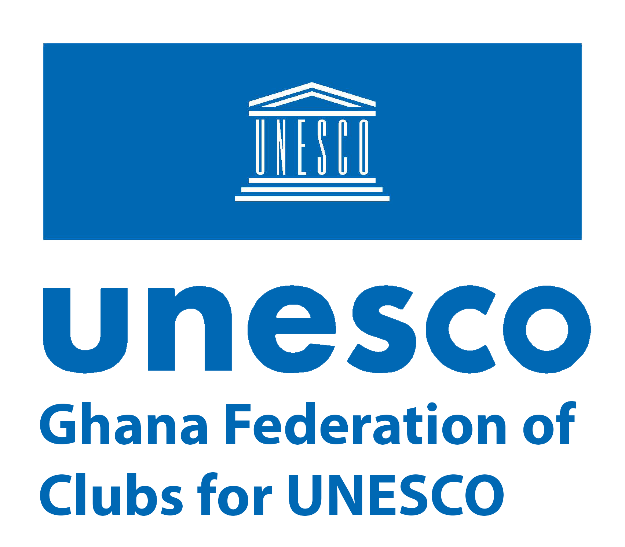 ABOUT US
ABOUT US
Since the foundation of the first UNESCO club in Japan, in 1947, UNESCO Associations, Centres and Clubs are members of non-governmental organizations of great value to the Organization.
Members of the UNESCO Club movement in Africa and Ghana are all volunteers of all ages, nationalities and social classes. They share a commitment to UNESCO’s ideals and work to make them a reality in every nation with ideas and actions that contribute to the development of humanity.
MISSION
Promote four main categories of UNESCO Clubs in Africa and Ghana:
- Clubs established in schools (whose members are students and teaching staff of educational institutions).
• Clubs to operate in universities and higher education institutions.
• Clubs not intended exclusively for schoolchildren or university students: they have a recognized legal status and among their members there are outstanding personalities from cultural circles or the public sector of the community.
What are UNESCO Clubs?
- Groups of people sharing UNESCO’s ideals and promoting peace through education, science, and culture
- Clubs’ members are all ages and come from all walks of life.
- Clubs undertake projects inspired by UNESCO base on sharing, solidarity, and exchange.
- Clubs help create national awareness for development rooted in cultural values unique to each country or group.
Historical Background
- Following the creation of UNESCO in 1945, a Clubs movement developed as a symbol of support for the new organization.
- The first UNESCO Club was formed in Sendai, Japan on July 19, 1947
- In November 1949, then Director-General of UNESCO, Jaime Torres-Bodet, launched an international appeal for the creation of UNESCO Clubs in schools and universities.
- The movement grew and today there are over 3,700 UNESCO associations, centres, and clubs in more than 100 countries.
What is UNESCO’s Association with UNESCO Clubs?
- National Commissions are the link between UNESCO and individual countries, providing information for their governments and citizens.
- Each National Commission for UNESCO is responsible for the Clubs in its member state.
- UNESCO respects the freedom of the Clubs thus there is no official link between the two.
- UNESCO does provide intellectual, material, or financial help for the Clubs as appropriate.
- Occasionally, UNESCO may suggest study themes or activities for the Clubs to pursue.
World Federation of UNESCO CLUBS, Centres and Associations (WFUCCA)
- The WFUCCA was founded in July 1981, its General Secretariat is located in Paris, France
- WFUCCA is an NGO that has official relations with UNESCO. A World Congress of WFUCCA is held every four years to evaluate, coordinate and integrate the Federation’s programmes.
- The WFUCCA brings together inter regional Club activities and encourages active cooperation among National Federations
Local and Regional Clubs
- In Africa, UNESCO Clubs are active in Kenya, Togo, Uganda, Gabon, Benin and Cote d’Ivoire.
- GFUCCA monitors all the individual clubs recognised by the national commission; Coordinates and facilitates and facilitates the registration process of UNESCO Clubs; Recognize exceptional contributions of individuals and clubs/organizations in fostering the ideals of UNESCO or advancement of UNESCO clubs’ movement.
History of UNESCO Clubs in Ghana
- In 1961, Ghana established its first UNESCO Clubs
- It was one of the first English-speaking African country to establish UNESCO Clubs
Goals of UNESCO Clubs
- UNESCO clubs have three goals: training, public outreach, and action.
- Clubs aim to function in a climate of trust and tolerance without discrimination based on sex, nationality, race, religion, social background, or political opinion.
- Clubs work to preserve cultural values and demonstrate the contribution of these values in local and global contexts.
Activities Organized by UNESCO Clubs
UNESCO Clubs host a wide variety of activities depending on member’s interests. Activities must be nonprofit and consistent with the ideals of UNESCO. Some examples are listed below:
- Celebration of: International Days, International Years
- Participation in: Literary Campaigns, Cultural Outings, Competitions in the Arts, Sports, and Musical Events
- Studies of: Racism and Discrimination, International Relations, Youth and Gender
and Environment and Nature
How Can I Participate?
- Contact the Ghana Commission for UNESCO
- Ask out about existing clubs in your area and how you can join their activities.
- If there is no UNESCO Club in your region, the Ghana Commission for UNESCO can provide you with the required information to set one up.
Contact national coordinators:
Mr. Apollonius Osei-Akoto Asare —- Email: apollonius.asare@unescoghana.gov.gh
Mr. Kofi Takyi Kwakye —- Email: kofi.kwakye@unescoghana.gov.gh
